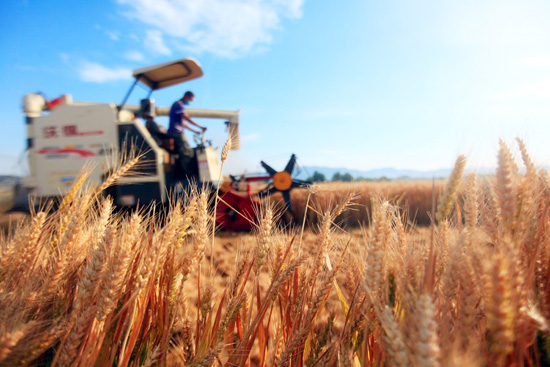China Daily
Food prices and global food security are currently under enormous stress. Because of the COVID-19 pandemic, the number of undernourished people in the world grew from 650 million in 2019 to an estimated 811 million in 2020. Also, international food prices have been climbing for the last two years.
According to the latest Food Price Index report released by the Food and Agriculture Organization of the United Nations on April 8, food prices are 34 percent higher compared with the same period last year-they have never been this high since the FAO started recording them.
The Russia-Ukraine conflict has certainly contributed to the increase in food prices and worsening of global food security. As the conflict continues, its impacts on the capacity of Ukraine to produce, harvest and export food products, leading to rising food prices, are being felt around the globe.
About one-third of global wheat exports comes from Russia and Ukraine. More than 50 countries in the world depend on Ukraine and Russia for over 30 percent of their wheat imports; the Middle East and Africa import more than half of their cereal supplies from the two countries. Russia is also the world’s largest fertilizer producer-the source of about one-fifth of the world’s fertilizer exports.
The impact is likely to be felt in China as well, even though China maintains a high level of food self-sufficiency and has high levels of food reserves. Both Ukraine and Russia are important sources of agricultural products and inputs for China. China imports 80 percent of its corn and 70 percent of its sunflower oil from Ukraine. Also, China imported 30 percent of its potassium fertilizer from Russia in 2021.
So with the unexpected resurgence of COVID-19 infections in various parts of China, it is legitimate to ask whether China’s food security is at risk.
In my personal opinion, China does not face any immediate threat to its national food security. China has made remarkable achievements in ensuring food security, and ceased to be a “food insecure” country long ago-at least since the early 2000. At the same time cereal production has more than doubled in the past four decades, and per capita grain and meat output has significantly improved.
China feeds 1.4 billion people, about one-fifth of the world’s population, with less than 10 percent of the world’s arable land. Although the current resurgence of infections in various parts of the country has raised awareness about potential risks to food security, China should not, in my view, be too concerned.
China’s food production has, in fact, been extraordinarily high for the past several consecutive years. Its per capita food production is above the world’s average. And food stocks are well above the minimum level recommended by the FAO. It has also maintained an overall 95 percent food self-sufficiency level over the past years, with 97 to 98 percent self-sufficiency for the three major staple crops.
Moreover, the experiences and lessons learned in managing the pandemic in early 2020 and minimizing the impacts of the pandemic on food production, distribution and overall food security will likely help China respond to the new outbreak rapidly and positively.
According to a report on the impact of COVID-19 on the rural economy by the International Fund for Agricultural Development and the Chinese Academy of Agricultural Sciences, coping strategies and mitigation measures such as increasing the capacity of logistics and inputs and food distribution under the so-called “green channel” policy, or switching of food distribution to alternative channels, such as e-commerce, proved effective in cushioning the disruption of food production and agrifood chains during the early stages of the pandemic in 2020-and can easily be replicated.
In conclusion, I do not see worrisome signals about an impending food crisis in China. However, rising inflation, mainly because of the rapidly increasing oil, energy and food prices, and the global economic slowdown, mainly since the disruption in trade and supply chains and the increasing uncertainty due to the Ukraine crisis, will possibly have an impact on the Chinese economy as well.
A recent World Bank report has warned that, in a downside scenario, China’s economic growth could be as low as 4 percent this year-against a target of 5.5 percent. Since, as always, the poorest and the most vulnerable will be the most affected, it is important for the country to expand the social safety nets in order to protect and support the vulnerable groups. And in the long run, focus should be placed on strengthening the capacity of these groups to cope and recover from shocks.
The author is the representative of the International Fund for Agricultural Development in China.





